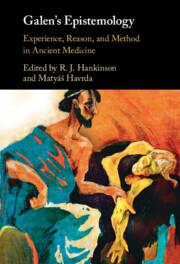Book contents
- Galen’s Epistemology
- Galen’s Epistemology
- Copyright page
- Contents
- Abbreviations
- Introduction
- Chapter 1 ‘Do I Wake or Sleep?’
- Chapter 2 Galen’s Empiricist Background
- Chapter 3 Discovery, Method, and Justification
- Chapter 4 From Problems to Demonstrations
- Chapter 5 Galen’s Notion of Dialectic
- Chapter 6 The Relationship between Perceptual Experience and Logos
- Chapter 7 Galen against Archigenes on the Pulse and What It Teaches Us about Galen’s Method of Diairesis
- Chapter 8 On Sense-Perception
- Chapter 9 Reason and Experience in Galen’s Moral Epistemology
- Chapter 10 The Arabic Alexandrians’ Summary of Galen’s On the Therapeutic Method
- Chapter 11 What Level of Certainty Can Medical Sign-Inference Reach?
- Bibliography
- Index of Passages
- General Subject Index
Chapter 3 - Discovery, Method, and Justification
Galen and the Determination of Therapy
Published online by Cambridge University Press: 04 May 2022
- Galen’s Epistemology
- Galen’s Epistemology
- Copyright page
- Contents
- Abbreviations
- Introduction
- Chapter 1 ‘Do I Wake or Sleep?’
- Chapter 2 Galen’s Empiricist Background
- Chapter 3 Discovery, Method, and Justification
- Chapter 4 From Problems to Demonstrations
- Chapter 5 Galen’s Notion of Dialectic
- Chapter 6 The Relationship between Perceptual Experience and Logos
- Chapter 7 Galen against Archigenes on the Pulse and What It Teaches Us about Galen’s Method of Diairesis
- Chapter 8 On Sense-Perception
- Chapter 9 Reason and Experience in Galen’s Moral Epistemology
- Chapter 10 The Arabic Alexandrians’ Summary of Galen’s On the Therapeutic Method
- Chapter 11 What Level of Certainty Can Medical Sign-Inference Reach?
- Bibliography
- Index of Passages
- General Subject Index
Summary
Galen insists that genuine epistêmê, in the Aristotelian sense of securely-founded scientific understanding, is available to the serious medical investigator. The foundations consist in propositions that are evidently true, and hence require no further support. These come in two types: those evident to the senses and those evident to reason, and these are ex heautôn pista, self-crediting, intrinsically trustworthy. On the basis of such propositions the diligent inquirer can erect a firmly-founded structure of practical knowledge, a technê, but one which is, none the less, in a genuine sense demonstration. In this chapter I re-examine what Galen says about a number of inter-related key issues: What is the ‘orderly method’ of discovery which Galen regularly commends, and berates his opponents for failing to adhere to? What supplies the ‘context of justification’ for such a firmly-founded science, and how does this relate to Galen’s oft-repeated affirmation of the necessity for empirical testing, peira? And finally, and relatedly, what specific role in all of this is played by what he calls ‘differentiated experience’, peira diorismenê?
Keywords
- Type
- Chapter
- Information
- Galen's EpistemologyExperience, Reason, and Method in Ancient Medicine, pp. 79 - 115Publisher: Cambridge University PressPrint publication year: 2022
- 1
- Cited by

